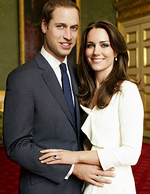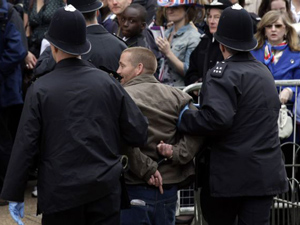Monarchy and madness
By Starla Muhammad -Staff Writer- | Last updated: May 5, 2011 - 1:52:43 PMWhat's your opinion on this article?

Prince William and Catherine Middleton
|
As predicted, those caught up in the fantasy of kings, queens, horse drawn carriages, pomp and circumstance lapped up the royal wedding circus like an obsessed fan, glued to the telly whilst viewing their favorite soap opera, nibbling on tea and crumpets. Nearly two billion people around the world watched the couple exchange vows at Westminster Abbey said media reports.
Wages were placed on the minutest of details for the April 29 ceremony. The Associated Press reported British bookmakers say they could see upward to one million pounds worth of wagers on the royal wedding.

Policemen arrest a bystander along Horse Guards Parade prior to the Royal Wedding procession, London, Britain, April 29. The royal wedding of Prince William and Catherine Middleton was expected to be followed by two billion viewers worldwide. An estimated 1 million people stood along the parade route for the wedding. Photo: EPA/JONATHAN BRADY
|
“We should be grateful that, although the country cannot afford health, welfare, education, libraries or pensions, at least we can afford for two over-privileged parasites to live like pigs in clover. It's romantic isn't it?” wrote Derek McMillan for Socialist Worker.
In fact, according to a recent article posted on Time magazine's website, one poll said 79 percent of Britons are indifferent or do not care about the royal wedding. But what is drawing the attention of a few is the cost being passed on to British taxpayers.
Hundreds of thousands of students and workers have taken to the streets of London and other cities to protest the British government's hike in university tuition and cuts in valuable social programs over the past several months. But, for the royal wedding, the show must go on.
Although the families of Prince William and Ms. Middleton foot the bill for the ceremony, the extra security required to police such an enormous event cost the British citizens anywhere from 4.8 to 19 million pounds. How many groceries could that provide to families of unemployed workers or struggling university students?
At least 5,000 police officers provided security and policed the royal wedding. What other dangers could have arisen by reassigning law enforcement to cover a wedding instead of policing crime ridden streets?
The Confederation of British Industry (CBI) complained that shutting down the British economy for the day would result in around six billion pounds in lost productivity reported Time. “… RSM Tenon places the entire cost of the country's April holidays at $50 billion, or roughly one-third of the budget for the nation's National Health Service, a significant figure at a time when the country is struggling to recover from financial and economic crises,” continued the Time article.
“This is a fragile time for the economy and we are concerned about the effect this lost productivity will have on our recovery,” CBI spokeswoman Sarah Lee is quoted as saying in Time.”
The UK's Republic movement and those with anti-monarch viewpoints say that a monarchy makes Britain seem “backward,” is undemocratic and a waste of money. Social media networks were abuzz with detractors.
At least 27 Republic movement groups have pages set up on Facebook, the world's most popular social networking site. One such organization, called Republic boasts a membership of 12,000.
A group calling itself “Anti-Monarchy (Republican)” on its Facebook page writes, “For everyone who disagrees with having a Monarchy in Britain. It is undemocratic and is a waste of money (about $66.5 million a year) which could be spent on better causes, such as health or education.”
The Windsors just keep on taking from the taxpayer and give very little back, says the Republic, another anti-monarch group on its website. “Despite doing little and achieving even less, they demand respect and deference from everyone.”
This royal wedding does nothing more than divert attention away from what is happening in other parts of the world, says Hughie Rose, UK representative for the New Black Panther Party. “I see it as something to take our minds off England really trying to get into war, they're trying to assassinate Brother (Muammar) Gadhafi under the pretense of there being human rights abuses,” Mr. Rose told The Final Call.
Keeping the monarchy gives the impression that some people are born superior to others posted Anti-Monarchy on its Facebook page. In the twenty-first century, a utopian society would consider every citizen to be equal, added the group.
Mr. Rose says for most Black Britons, the day of the royal wedding is just another day because it “has nothing to do with us.” Unfortunately it seems this mindset might not be present in some of the Black British Commonwealth nations of the Caribbean.
“What has been very strange is all of the African and Caribbean leaders coming in from overseas for this event. They're spending hundreds of thousands of pounds (dollars) to come here while their people are suffering in poverty,” said Mr. Rose. It is going to cost a million dollars for the attorney general of Jamaica to attend the UK affair when that government just had to get a loan to pay government staff, he continued.
“It's just really, absolutely crazy to me, the amounts of money being spent while people are in abject poverty in those commonwealth countries that are going to be attending this event when that money could be used elsewhere,” noted Mr. Rose.
“Having positions only open to a small number of people, in this case one family, just continues class divides and creates a system where some people have automatic unearned privilege. This is morally wrong,” says Anti-Monarchy (Republican).
One must look no further than use of the label “commoner” in describing those not born into the self-appointed aristocracy and upper echelon of the House of Windsor.
Although the British monarchy is not scheduled to disappear anytime soon, what is becoming more clear is that important issues like the economy, wars, severe budget cuts, unemployment and racism are of greater concern, at least for British citizens that see the big picture.
Care to wager on that?
INSIDE STORIES AND REVIEWS
-
-
About Harriett ... and the Negro Hollywood Road Show
By Rabiah Muhammad, Guest Columnist » Full Story -
Skepticism greets Jay-Z, NFL talk of inspiring change
By Bryan 18X Crawford and Richard B. Muhammad The Final Call Newspaper @TheFinalCall » Full Story -
The painful problem of Black girls and suicide
By Charlene Muhammad -National Correspondent- » Full Story -
Exploitation of Innocence - Report: Perceptions, policies hurting Black girls
By Charlene Muhammad -National Correspondent- » Full Story -
Big Ballin: Big ideas fuel a father’s Big Baller Brand and brash business sense
By Bryan Crawford -Contributing Writer- » Full Story






 Click Here Stay Connected!
Click Here Stay Connected!








